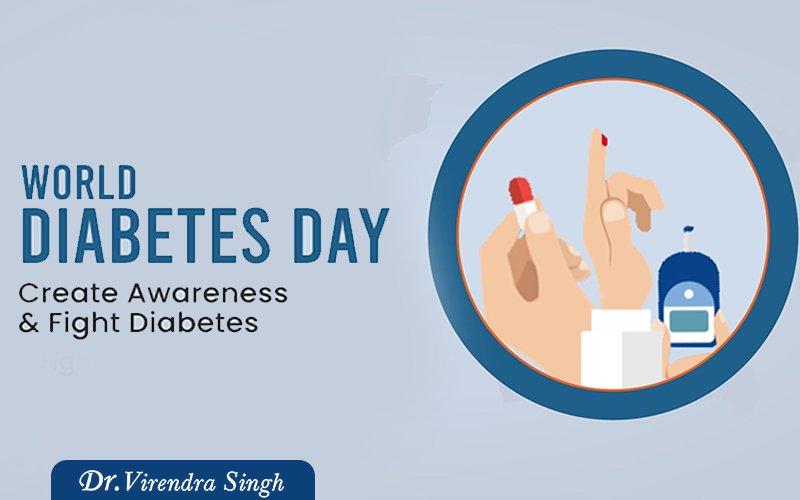
The goal of World Diabetes Day is to increase public awareness of the serious health effects of diabetes and its rising prevalence. This day helps the global community unite under one voice to fight diabetes and support those affected. This day reminds us that diabetes is not just a medical condition but a shared responsibility with millions affected worldwide. Together, we can prevent difficulties and enable people to live longer, healthier lives by encouraging healthy habits, routine checkups, and caring care. Together, we can raise awareness on World Diabetes Day and create a future free from the silent effects of the disease.
On World Diabetes Day 2025, Dr. Virendra Singh emphasizes the importance of early detection, awareness, and lifestyle management in combating diabetes. According to Dr. Virendra Singh, Diabetes can be prevented and controlled by being aware of the disease and taking a balanced approach to health, which includes eating right, exercising frequently, and getting regular checkups. He motivates and encourages individuals to stay informed about their blood sugar levels and avoid neglecting early warning signs. His guidance motivates individuals to take control of their health and collaborate to eradicate diabetes in the future.
The Theme of World Diabetes Day 2025
The theme for World Diabetes Day 2025, “Diabetes and Well-Being,” highlights the vital connection between a diabetic’s quality of life, emotional equilibrium, and physical health. This year’s campaign urges physicians, legislators, and communities to consider the patient’s overall health rather than just blood sugar levels. Managing diabetes is not only about medication and diet; it also involves mental health support, lifestyle education, stress management, and community connection. The goal is to enable the patient to manage the difficulties of diabetes while leading a balanced, healthy life. The significance of treating the individual, not just the disease, is emphasized by World Diabetes Day 2025, which promotes holistic care, early intervention, and supportive environments.
Understanding the Disease: What is Diabetes?
Diabetes is a long-term illness in which the body either produces insufficient amounts of insulin or is unable to use it effectively. The patient’s blood sugar (glucose) level becomes too high. Over time, high blood glucose damages nerves, organs, and blood vessels. The purpose of both Diabetes Day and Global Diabetes Day is to raise public awareness of the disease, its causes, and its effects on health.
What are the Different Types of Diabetes?
- Type 1 Diabetes: The pancreatic beta cells that produce insulin are attacked by the patient’s immune system. Insulin production is stopped by the body. Children and adolescents are frequently diagnosed with type 1 diabetes.
- Type 2 Diabetes: Insulin resistance or inadequate insulin production occurs in the patient. Although it is more prevalent in adults, changing lifestyles are making it more noticeable in younger individuals.
- Gestational Diabetes: The patient develops high blood sugar during pregnancy. It increases risks for both mother and baby. It may cause issues during or after delivery if left untreated.
Importance of Diabetes Awareness: Why Early Detection Matters?
Early diabetes detection is important since treatment can start sooner if a patient is aware of their condition. Complications, including kidney damage, vision loss, heart disease, and nerve issues, can be avoided with early treatment. World Diabetes Awareness Day and associated initiatives place a strong emphasis on screening, routine examinations, and risk factor awareness to enable patients to take preventative action.
What are the Early Signs and Symptoms of Diabetes?
The body frequently gives mild indicators that something is amiss before diabetes is officially diagnosed. These changes may initially seem minor or unconnected, but they may indicate underlying problems with the body’s energy and sugar regulation. It’s critical to identify these early trends because they give the patient an opportunity to get treatment before problems arise.
Early detection of diabetes is often possible by paying attention to a group of common symptoms. Over time, these symptoms could appear and be written off as small problems. However, when experienced together or over time, they suggest that the body is struggling to regulate blood sugar. On World Diabetes Day, the emphasis is not only on medication but also on assisting the patient in identifying these warning signs early and acting accordingly.
- Frequent Urination (Polyuria)
- Extreme Fatigue
- Excessive Thirst (Polydipsia)
- Slow Healing of Wounds
- Blurred Vision
- Increased Hunger (Polyphagia)
- Unexplained Weight Loss
What are the Complications of Prolonging Diabetes Treatment?
Diabetes can have major health effects if it is not identified or treated appropriately. Long-term exposure to elevated blood glucose levels can harm the body’s main organs and systems. Complications may include:
- Cardiovascular Disease: Increased the risk of stroke, heart attack, and hypertension.
- Kidney Damage (Diabetic Nephropathy): May result in renal failure and dialysis requirements.
- Vision Problems (Diabetic Retinopathy): If treatment is not received, it could result in blindness.
- Nerve Damage (Diabetic Neuropathy): Can cause pain, numbness, and even limb amputations.
- Foot Complications: Nerve injury and poor circulation might result in infections, ulcers, or amputation.
- Skin Conditions: Higher susceptibility to bacterial and fungal infections.
Prevention and Management
Prevention and management require ongoing effort.
- Healthy Diet: Limit sugar and processed foods and place an emphasis on fruits, vegetables, whole grains, and lean proteins.
- Regular Physical Activity: At least 150 minutes per week of moderate exercise.
- Weight Management: Keep your body weight within a healthy range; if you are overweight, lose a little weight.
- Monitoring Blood Glucose Levels: Use home glucometers and attend regular tests.
- Medication Compliance: The patient must adhere to the dosage and schedule if insulin or oral hypoglycemic medications are provided.
- Regular Check-ups: Include eye exams, kidney function tests, and cardiovascular screenings.
FAQs
When is World Diabetes Day 2025 celebrated?
It is celebrated on 14th November 2025 every year.
What are the common symptoms of diabetes?
Frequent urination, tiredness, excessive thirst, slow-healing wounds, and blurred vision.
Why do we celebrate World Diabetes Day?
To raise awareness about diabetes prevention, management, and care.
What are some ways to prevent diabetes?
Eat healthy, maintain a healthy weight, stay active, and get regular checkups.
What symbol represents World Diabetes Day?
The blue circle symbolizes global unity in the fight against diabetes.
